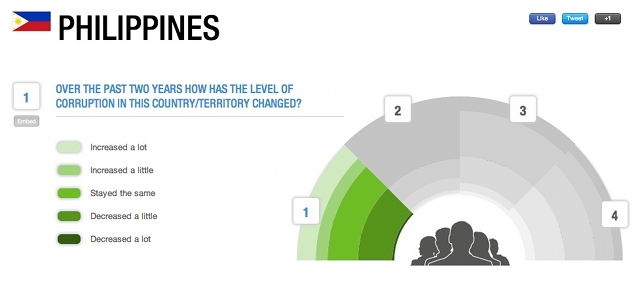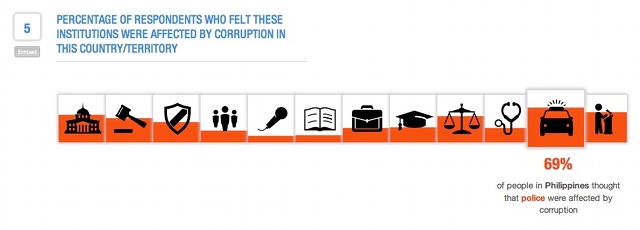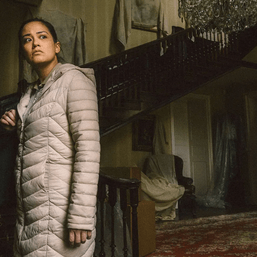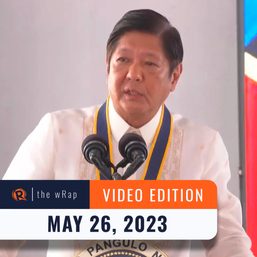SUMMARY
This is AI generated summarization, which may have errors. For context, always refer to the full article.

MANILA, Philippines – Is the fight against corruption gaining traction in the Philippines?
A report of Berlin-based Transparency International showed corruption in the Philippines decreased over the last two years.
This is one of the findings listed in the group’s Global Corruption Barometer 2013, which Transparency International calls the biggest survey tracking worldwide public opinion on corruption. The report was released on Tuesday, July 9.
In the Philippines, Transparency International surveyed 1,000 respondents nationwide using face-to-face interviews.
Twelve percent of respondents reported paying bribes in the past year to any one of these 8 services: police, judiciary, registry, land, medical, education, tax, and utilities.
The figure is down from the 16% who reported paying bribes in the Global Corruption Barometer 2010/2011.
The 2013 report put the Philippines in the same cluster as Argentina, Chile, El Salvador, Hungary, Israel, Jamaica, Palestine, Rwanda, and Vanuatu or countries where 10% to 14.9% of respondents reported paying bribes in the last year.
In the Philippines, 35% of respondents said corruption “decreased a little,” 31% said it “stayed the same,” 19% said it “increased a lot,” 12% said it “increased a little,” and only 2% said it “decreased a lot.”
Since 2003, the Global Corruption Barometer has been surveying the experiences of everyday people confronting corruption around the world.
It is different from Transparency International’s Corruption Perception Index, which ranked the Philippines 105th out of 176 countries in 2012.

‘Police most corrupt institution’
Respondents in the Philippines identified the police as the most corrupt among 12 institutions. This was the same finding in the 2010/2011 survey.
In a scale of 1 to 5, with 5 being extremely corrupt, the police got a score of 4.
Here is the list of institutions and their respective scores, listed from those perceived to be most corrupt to those perceived to be least corrupt:
- Police – 4.0
- Public officials / Civil Servants – 3.8
- Political parties – 3.7
- Parliament/Legislature – 3.5
- Judiciary – 3.5
- Military – 3.2
- Business/Private Sector – 2.9
- Education system – 2.8
- Medical and Health – 2.8
- NGOs – 2.7
- Religious bodies – 2.3
- Media – 2.2
Despite their experience with corruption, 61% to 80% of respondents agreed or strongly agreed with the statement that “Ordinary people can make a difference in the fight against corruption.”
The survey said 84% of respondents expressed willingness to get involved in anti-corruption activities.
Of 5 options, respondents in the Philippines chose signing a petition as the anti-corruption activity they are most willing to engage in.
The other 4 choices were joining a peaceful protest, joining an anti-corruption organization, paying more to buy from a corruption-free company, and spreading word about corruption through social media.
The Office of the Ombudsman has said that corruption in government transactions is losing ground.
In 2010, it commissioned a National Statistics Office survey that showed only 10% of those who accessed government services paid bribes to facilitate transactions. The Ombudsman said the number was lower than that in the Global Corruption Barometer.
READ: Corruption linked to ‘culture of expectations’
Fighting corruption is a priority of the Aquino administration, with President Benigno Aquino III winning the presidency on a promise to reduce graft.
Aquino lent his political capital to push for the removal of former Chief Justice Renato Corona for failing to declare his bank deposits. Yet observers have said that corruption remains pervasive in lower levels of government.
Global corruption worsening
Besides the Philippines, 106 other countries were surveyed in the Global Corruption Barometer 2013. There were 114,000 respondents worldwide.
The survey found that global corruption worsened in the past two years, and a quarter reported paying bribes in the last 12 months.
Transparency International pointed to a connection between poverty and graft.
“In Zimbabwe, women giving birth in a local hospital have been charged US$5 every time they scream as a penalty for raising false alarm. In Bangladesh, the recent collapse of a multistory factory, which killed more than 1,100 people due to a breach of basic safety standards, has been linked to allegations of corruption.”
Transparency International is a global civil society organization fighting corruption. It has 90 chapters worldwide and works with partners in government, business and civil society to develop and implement measures to tackle it. – Rappler.com
Add a comment
How does this make you feel?














There are no comments yet. Add your comment to start the conversation.